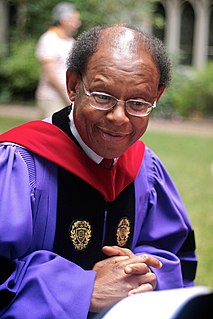A Quote by William Edward Hartpole Lecky
All over Europe the organs that represent dogmatic interests are in permanent opposition to the progressive tendencies around them, and are rapidly sinking into contempt. In every country in which a strong political life is manifested, the secularisation of politics is the consequence. Each stage of that movement has been initiated and effected by those who are most indifferent to dogmatic theology, and each has been opposed by those who are most occupied with theology.
Related Quotes
Theology is not a private subject for theologians only. Nor is it a private subject for professors. Fortunately, there have always been pastors who have understood more about theology than most professors. Nor is theology a private subject of study for pastors. Fortunately, there have repeatedly been congregation members, and often whole congregations, who have pursued theology energetically while their pastors were theological infants or barbarians. Theology is a matter for the Church.
What actions are the most excellent? Those, certainly, which most powerfully appeal to the great primary human affections: to those elementary feelings which subsist permanently in the race, and which are independent of time. These feelings are permanent and the same; that which interests them is permanent and the same also.
When climate change gets some attention in a 100-page document, the most important parts of which will have to do with the theology of stewardship and the theology of "human ecology," it's almost certainly going to be rapturously embraced, or bitterly opposed, as a "global-warming encyclical," despite the evidence that it's much more broadly gauged than that.
In every system of theology, therefore, there is a chapter De libero arbitrio. This is a question which every theologian finds in his path, and which he must dispose of; and on the manner in which it is determined depends his theology, and of course his religion, so far as his theology is to him a truth and reality
Although it has been fashionable to deny it, anti-slavery doctrines began to appear in Christian theology soon after the decline of Rome and were accompanied by the eventual disappearance of slavery in all but the fringes of Christian Europe. When Europeans subsequently instituted slavery in the New World, they did so over strenuous papal opposition, a fact that was conveniently 'lost' from history until recently. Finally, the abolition of New World slavery was initiated and achieved by Christian activists.
"Biblical theology" refers to something more precise than theology that is faithful to the Bible. It might be helpful to draw a contrast: at the risk of oversimplification, systematic theology tends to organize theology topically and with an eye cast on its contemporary relevance, while biblical theology tends to organize the same biblical material so that it is easier to see the distinctive contribution of each biblical book and human author, and to trace the trajectories of themes across the Bible so we see how the books of the Bible hold together.
Theology is a non-subject. I'm not saying that professors of theology are non-professors. They do interesting things, like study biblical history, biblical literature. But theology, the study of gods, the study of what gods do, presupposes that gods exist. The only kind of theology that I take account of are those theological arguments that actually argue for the existence of God.
Theology is indispensable for religious communities to make sense of themselves and their changing views about the world in light of what is perceived to be revelation, but, at the same time, that theology can have a pretentiousness, or double pretentiousness, if it is acontextual as opposed to contextual, if it is foundationalist as opposed to antifoundationalist, or ahistorical as opposed to historicist.


































